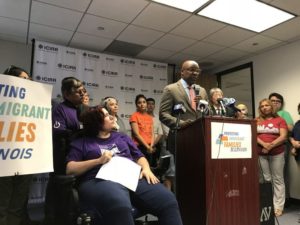Illinois sues over new rule that could deny green cards to those on public aid: ‘It’s another attempt … to intimidate immigrants’

For U.S. Rep. Raja Krishnamoorthi, a new rule that could curb the ability of working-class immigrants to seek permanent residency in the United States struck a personal note.
Krishnamoorthi, a Democrat from Schaumburg, was an infant when his parents emigrated from India. But in the 1970s, the family had economic difficulties and relied on food stamps and public housing, he said. Still, his parents bounced back and he rose to become an Illinois congressman.
“We were a public charge at one time and, (under the new rule) we would have been prohibited from gaining access to permanent residency and later citizenship,” Krishnamoorthi said Thursday to a packed room of immigration advocates in the Loop. “And so I would not be in the halls of Congress.”
He was among those who gathered Thursday to criticize the latest attempt by President Donald Trump’s administration to further limit immigration. In this case, the new rule could deny green cards to legal immigrants who receive public aid such as food stamps or temporary assistance.
U.S. Citizenship and Immigration Services, a federal agency under the Department of Homeland Security, announced the changes this week following a period of public comment last year.
The rule will go into effect Oct. 15, but it is already facing legal challenges. Illinois was one of more than a dozen states that jointly filed a federal lawsuit this week seeking to stop the rule, Illinois Attorney General Kwame Raoul announced Thursday.
“This public charge plan is not only illegal … it’s un-American,” Raoul said, “and it’s consistent with what (Trump) expressed early last year, and that it is racist. It’s another attempt by the federal government to intimidate immigrants.”
“Public charge” refers to immigrants who are primarily dependent on public assistance. But the new rule broadens the definition of a public charge, which could lead to the agency denying the application of someone who entered the country legally and is seeking permanent residency. It also applies to those seeking to extend a visa or apply for a different type of visa, according to the lawsuit challenging the rule.
Under the changes, people who have used or are likely to use programs such as Supplemental Security Income, Temporary Assistance for Needy Families, Supplemental Nutrition Assistance Program (or SNAP), some forms of Medicaid and certain housing programs would disqualify them from permanent residency.
Stephen Yale-Loehr, an immigration attorney and professor at Cornell Law School, said the rule change will give immigration officials more discretion when reviewing someone’s application for residency or a visa. Officials also will review other factors such as a person’s age, health, family status, overall assets, their employment record and how well they speak English, he said.
“It gives immigration officials discretion to weigh all of these various circumstances that’s likely to mean many more denials based on public charge concerns,” Yale-Loehr said.
Fred Tsao, senior policy counsel for the Illinois Coalition for Immigrant and Refugee Rights, said the broader impact could be confusion among immigrant families, particularly those in mixed-status households that could include children who are U.S. citizens.
Tsao noted that the rule change came days after wide-scale immigration arrests in Mississippi, and shortly after a mass shooting in El Paso whose victims were primarily of Mexican descent.
U.S. Rep. Jesús “Chuy” García of Chicago more bluntly described the rule as divisive and racist. He urged the immigration advocates to work together to stop the changes.
“It is anti-American, it is immoral, it is ineffective and it is a racist policy,” Garcia said. “We must fight this at every level.”
But Ken Cuccinelli, the acting director of U.S. Citizenship and Immigration Services, told reporters this week that the rule will ensure that those who immigrate to the United States don’t become a burden.
“We want to see people coming to this country who are self-sufficient,” he said. “That’s a core principal of the American Dream. It’s deeply embedded in our history, and particularly our history related to legal immigration.”
In an interview with NPR, Cuccinelli said the poem etched on the Statue of Liberty, long a symbol of America’s embrace of immigrants, should be amended to state: “Give me your tired and your poor who can stand on their own two feet and who will not become a public charge.”
A so-called “public charge” requirement dates back to the 1882 Chinese Exclusion Act, but it was never defined in the way the new rule does, detractors say.
Yale-Loehr said legal challenges to the rule are likely to question whether the agency overstepped its authority to change immigration rules and policies without going through Congress.
“They’ll argue that the agency overstepped authority in trying to make this major change through a rule,” Yale-Loehr said.
The federal lawsuit is seeking to stop the rule, with states arguing it is unconstitutional and contrary to legislation and the intent of Congress, according to court records.
Sonianne Lozada of the Greater Chicago Food Depository said there has already been a “chilling effect” on immigrant communities since last year when news of the rule changes was made public. Lozada said the depository has heard from families who are opting out of programs even though they have U.S. citizen children.
“We are concerned about the effects this policy will not only have on the immigrant communities, but on our capacity to be able to provide them with food when they most need it,” Lozada said. “So while the food depository has a strong response to hunger in Chicago and Cook County … it really doesn’t compare to the amount of food assistance that the SNAP program provides.”
Author: Elvia Malagón
PC: Elvia Malagón, Chicago Tribune
Source
